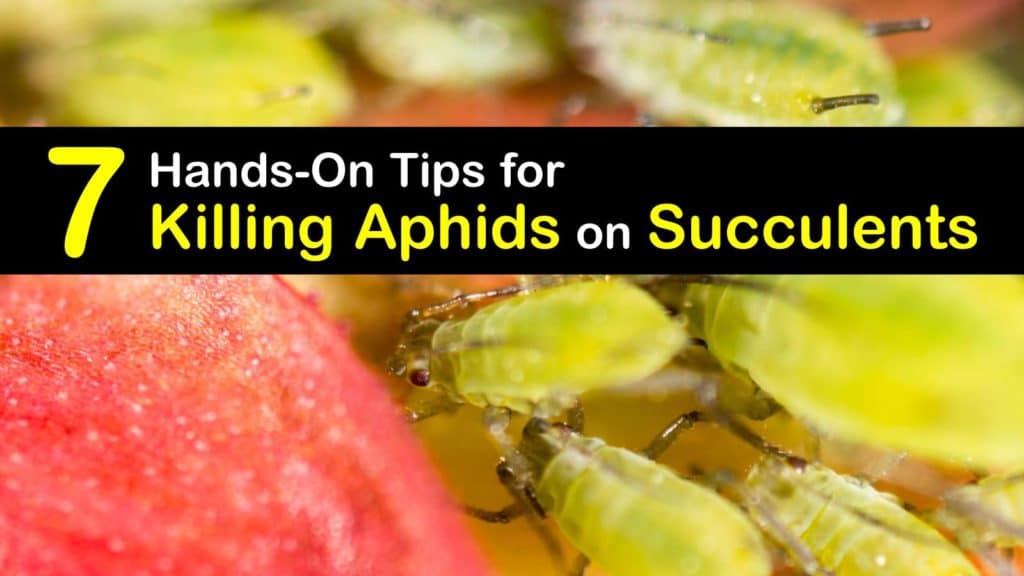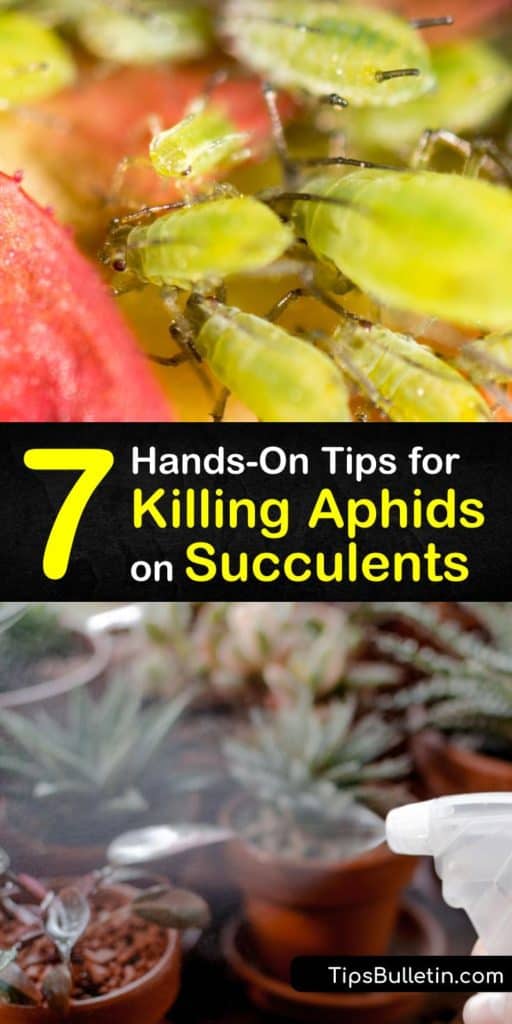Succulents are becoming increasingly popular among gardeners and homeowners. These resilient, easy-to-maintain plants bring beauty and variety to a garden or landscape, which is easily spoiled when aphids attach to their plump leaves. If you want to know how to get rid of aphids on succulents, keep reading.
There are many benefits to growing succulents around your home. Aside from thriving in virtually any climate, succulents have other added benefits like air purification and humidity control. If you’ve discovered aphids feasting on your new plants, it’s worth trying to save them.

About Aphids
Almost all plants have some species of aphids that feed on them. Winged adults start the life cycle of an aphid infestation. The adults land on a succulent leaf to lay eggs. Once the eggs hatch, they feast on leaves until they’re grown and fly off to repeat the process.
Aphids have pear-shaped bodies and come in a rainbow of colors like yellow, green, white, black, brown, and even pink. These tiny insects only grow to a quarter of an inch in size but pack a significant punch in the destruction of your garden.
The aphids gorge on the fleshy leaves and produce a sugary waste product called honeydew. The honeydew attracts ants who feed on the waste and encourages the growth of black, sooty mold.
Thankfully, aphids aren’t that difficult to get rid of. Try a home remedy for aphids on succulents and watch your damaged plants thrive once again.
How to Get Rid of Aphids on Succulents
Once you know how to kill aphids on succulents, you’ll find it easy to keep these critters at bay. Start by taking a gentle approach and get more aggressive as you go.

A Simple Home Remedy for Aphids on Succulents
It may not seem like enough, but water itself has proved successful in killing aphids on succulents. It’s also ideal to kill aphids on tomato leaves, milkweed, and hibiscus plants. With a strong stream of water, spray your plants every morning until the insects are no longer visible.
Keep in mind that desert dwellers like Echeveria don’t respond well to overwatering, so verify that this technique won’t drown your succulent plants.
How to Kill Aphids on Succulents with Soap
Dish soap is particularly useful in killing an aphid population. When an aphid comes in contact with soap, the spiracles that allow the insect to breathe become clogged.
If you are going to use an organic aphid spray as a home remedy for aphids on succulents, invest in purchasing a pure soap, such as Castile. Pure soaps are free from harmful chemicals for plants, but often contain animal fats or vegetable oil that smother the aphids.
For this home remedy for aphids on rose bushes and other plants, mix two cups of water, one teaspoon of dish soap, and one teaspoon of vegetable oil in a spray bottle. Shake to combine. Lightly mist the soap spray on both sides of the plants’ leaves.
Use a cotton swab to reach any tight areas. Wait three to four hours and then wipe the leaves with a damp cloth. Reapply every three days until the aphids disappear.
Alcohol and Soap Aphid Killer Recipe
Take a trip to your bathroom closet and pull out a few basic products that make aphids disappear. Because succulents make one of the best plants for the bathroom, you won’t have to travel too far when whipping up this aphid remover recipe.
Combine equal parts alcohol and water in a spray bottle. Add the dish soap and shake. Spray the entire plant with the soapy water solution and let sit for three hours. Wipe the solution off with a damp cloth. Repeat until aphids are gone.
Using Insecticidal Soap to Kill Aphids
Insecticidal soap is another excellent tool in killing aphids on succulents. This insect killing soap is used strictly on soft-body insects like aphids, mealybugs, scale insects, whiteflies, and other common pests.
This soap contains potassium salts from fatty acids that permeate and disrupt the insect’s cell membranes. Insecticidal soap needs to be sprayed directly onto an insect’s body.
Spray the soap on your succulents in the early morning when the cool temperatures keep the plant wet longer. In 24 hours, the insecticidal soap kills every aphid that made contact.
Killing Aphids with Alcohol
If you’re not interested in purchasing Castile soap to get rid of the aphids on your succulents, isopropyl alcohol works in ridding your succulents from aphids without harming plant growth.
Mix alcohol with water in a spray bottle. Spray the solution on a test leaf and wait 24 hours to ensure no damage takes place. If your succulent reacts well to the solution, spray your succulent every three days until the aphids disappear.
Other Ways to Kill Aphids on Succulents
If soap and alcohol sprays aren’t working for you, there are plenty of other aphid control options. Try implementing a new home remedy for aphids on succulents with one of the following options.
Kill Aphid Eggs with Oils
Horticultural oil and neem oil spray for plants are other products that kill insects by suffocating them. These oils also interrupt the metabolism of insect eggs, which make them starve.
Don’t feel too bad for them; aphids and other succulent-eating insects sometimes carry diseases and infect your entire garden. Spray these oils on your plants in the early spring when the weather is cool.
Mix equal parts oil and water in a sprayer or spray bottle and apply it to the infected plants. Read the label on any horticultural oil to ensure proper use.
Repelling Aphids with Other Insects
Not all insects are dangerous to our succulent plants. There are many beneficial insects to our gardens, and some of these good bugs deter or eat the bad ones.
Beneficial insects include ladybugs, lacewings, parasitic wasps, hover flies, and more. Populations of these pollinators are for sale online.
Companion Planting
The more knowledge you have on how to get rid of aphids on succulents, the easier ridding these pests becomes. You don’t have to purchase chemicals or make sprays to free your succulents from aphids. A large variety of companion plants work wonders in repelling aphids.
Garlic and onion release a strong sulfur scent that repels aphids from sticking around. Mint, cilantro, and oregano also produce repulsive odors to the pests. Better yet, these plants blend in with your garden and can be used to cook a flavorful home-cooked meal.
Sometimes the best pest control is adding plants that only make your garden more stunning. Planting Marigolds attracts aphid eaters. Many other plants help rid your succulents from pests.
Diatomaceous Earth for Repelling Aphids
Succulents aren’t only for planting outside. They make one of the best indoor plants for cleaning air and adding humidity to a room.
An easy way to deter aphids and fungus gnats from your houseplants is to sprinkle a small amount of food-grade diatomaceous earth onto the soil when repotting your plants. The pests that eat this product die, and it continues to prevent insects from damaging your indoor succulents.
Keeping your succulents happy and out of harm’s way pays off with minimal work. By trying out one of these tips, your succulents and cacti will thrive, and you’ll reap the benefits of these resilient plants.

If you’ve discovered the simplicity of how to get rid of aphids on succulents, share these tips on clearing your succulent plants from aphids on Facebook or Pinterest.